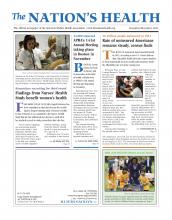Throat and mouth cancers in young white adults have risen dramatically thanks to human papillomavirus, according to a recent study.
The virus, also known as HPV, is linked to a 113 percent increase in oropharyngeal cancer in white Americans between 1973 and 2009, according to a study presented in September at the 55th Annual Meeting of the American Society for Radiation Oncology in Atlanta.
Oropharyngeal cancer affects the pharynx, tonsils, base of tongue and soft palate.
Physicians have been seeing an increase in young people coming for treatment for oropharyngeal cancer, said study co-author Farzan Siddiqui, MD, PhD, director of the Head and Neck Radiation Therapy Program at Henry Ford Hospital’s Department of Radiation Oncology in Detroit.
“If they’re HPV-related, they have a good prognoses and we’re able to cure these cancers in the large majority of the persons,” Siddiqui told The Nation’s Health. “But these people, in their late 30s and early 40s, they have surgery, radiation and chemotherapy. That makes a huge impact on their quality of life. There are a lot of long-term side effects they’ll have to life with.”
Meanwhile the oropharyngeal cancer rate in black Americans decreased by 52 percent between 1973 and 2009, but the population’s five-year survival rate was worse, the study said.
Siddiqui said the drop in rates could possibly be linked to the effectiveness of anti-smoking campaigns. But the poor survival rate may be due to the fact blacks tend to have more cases of substance abuse-related oropharyngeal cancer, which has worse outcomes than cancers linked to HPV, he said.
Researchers examined data from cancer patients younger than 45 over the 36-year period using the National Cancer Institute’s Surveillance Epidemiology and End Results database. The study determined the likelihood of HPV based on the severity of the tumors, known as the tumor grade. Aggressive cancer cells have a higher grade and are typically linked to HPV, Siddiqui said.
Physicians need to be educated about the signs of oropharyngeal cancer, Siddiqui said. Any patients who complain about unusual lumps or bumps in their neck, or difficulty swallowing, should receive a follow-up to check for possible cancer.
“All of us we have a very strong support for helping these people out,” Siddiqui said. “Having a strong approach to treating these cancers is needed.”
For more information, visit www.redjournal.org/article/S0360-3016%2813%2901819-1/fulltext.
- Copyright The Nation’s Health, American Public Health Association









